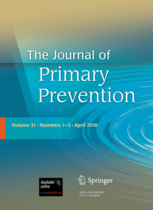For Immediate Release: September 16, 2013
 Research undertaken by scholars at the Wellesley Centers for Women (WCW), that examines adolescents' sexual behavior in relation to discord with their mother’s religiosity, is featured in the Journal of Primary Prevention (October 2013, Volume 34, Issue 5, pp 329-343.
Research undertaken by scholars at the Wellesley Centers for Women (WCW), that examines adolescents' sexual behavior in relation to discord with their mother’s religiosity, is featured in the Journal of Primary Prevention (October 2013, Volume 34, Issue 5, pp 329-343.
“The findings demonstrate how shared and unshared family religious practices and beliefs can support or impede the sexual health of emerging adults,” notes Jennifer Grossman, Ph.D., lead author and WCW research scientist. “Whereas shared prayer may be protective in families, the potential for religious differences to generate conflict suggests the importance of thoughtfully addressing family differences in religiosity,”
This study longitudinally investigates the relationship between adolescent/mother religious discordance and emerging adult sexual risk-taking six to seven years later. The research team of Grossman, Allison Tracy, Ph.D., WCW methodologist and senior research scientist, and Anne Noonan, Ph.D., assistant professor of psychology at Salem State University, utilized Social Control Theory to examine the level and direction of concordance using data from Wave I and Wave III of the Add Health Study, focusing on constructs of religious importance, frequency of prayer, and attendance at religious services.
The team found that higher levels of adolescent/mother discordance in religious importance were related to increased emerging adult sexual risk-taking compared to those with similar levels of adolescent/mother religiosity—this occurred only when mothers reported higher levels of religious importance than their children. In contrast, adolescents reporting higher frequency of prayer than their mothers reported lower levels of sexual risk-taking than those with similar frequency of adolescent/ mother prayer.
The findings suggest that the protective effects of family religious socialization can be interrupted. However, the influence of religious difference on sexual risk-behavior operates differently depending on the direction and level of religious difference. Even in emerging adulthood—a period marked by distance from childhood values and institutions—religious difference with a parent remains a meaningful influence.
The research and article were supported by the National Institute of Child Health and Human Development of the National Institutes of Health (Grant number R03HD057572-01). The Wellesley Centers for Women is one of the largest gender-focused research-and-action organizations in the world. Scholars at the Centers conduct social science research and evaluation, develop theory and publications, and implement training programs on issues that put women’s lives and women’s concerns at the center.

